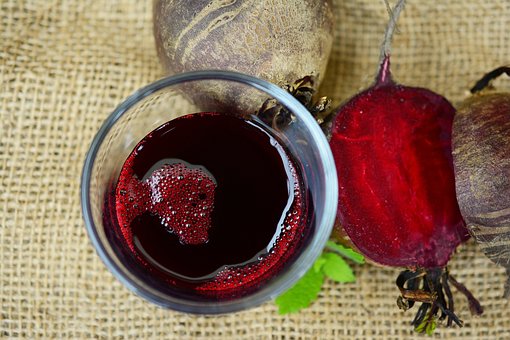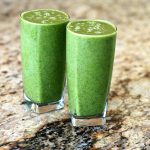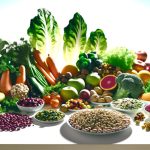There is no denying that eating fruits and vegetables increases one’s health and immunity. They provide a combination of nutrients, vitamins, antioxidants, and minerals that are not typically found in your diet. They also help with detoxification, ridding the body of toxins.
Beetroot is a superfood that has become popular in smoothies in recent years. Many health professionals and nutritionists recommend eating it for its vitamins and minerals.
Although beetroot may not be the first food you think of when considering what to eat, it is still an important food to buy when grocery shopping.
Nutritional Facts of Beetroot
When you first see beetroot, it may look a little muddy. That’s normal. It is a root vegetable that has long stems, thick skin, and is reddish-purple in color. The earthy and bitter taste of beets is best offset by brighter, sweeter, and fresher flavors.
Nutritional Information of beetroots for 100 gms –
- Energy – 43 kcal
- Carbohydrates – 8.8 g
- Dietary fiber – 3.5 g
- Fats – 0.1 g
- Protein – 1.7 g
Beetroot is a delicious, highly versatile root vegetable, with a range of beneficial nutrients like nitrates, betalain pigments, fiber, and vitamins and minerals like folate, magnesium, potassium, vitamin B-6, iron, thiamine, riboflavin, glutamine, zinc, copper, and selenium. Beetroot has a long history of traditional use in treating various ailments like blood circulation, menstruation, and hepatobiliary disorders.
The dietary nitrates in beetroot are important for the treatment of hypertension because they help produce nitric oxide in the endothelium.
It helps blood flow better in the arteries and veins, which can help with erections and lower the amount of cholesterol in the arteries, which can lead to heart attacks.
This isn’t the end of the impressive resume for beetroot, and it’s no surprise that it can help improve your athletic performance and promote a longer life by being healthy.
Health and Nutrition Benefits of Beetroot
Below are the benefits that you will enjoy in your beetroot-rich diet:
1. Beetroot Lowers Blood Pressure
Beetroot contains nitric oxide, which causes the widening of blood vessels and increased blood flow to tissues. An increase in nitric oxide levels has been shown by numerous studies to help lower blood pressure in healthy individuals.
The nitrates in beets help blood vessels relax, which lowers the high blood pressure state.
Lab studies have shown that adding beetroot to your diet can help to reduce hypertension or blood flow disorders. To see these benefits, aim to add a 200-250mL glass of beetroot juice or 80-100 grams of beet to salads to your diet daily.
2. Beetroot Prevents Anemia
Some people might think that the only benefit of eating beetroot is that it can help prevent anemia.
Studies have found that beetroot juice is high in iron and folic acid, which helps to form red blood cells. Red blood cells carry oxygen and nutrients around the body, ensuring a healthy blood count.
Drinking beetroot juice regularly can help prevent menstrual disorders, anemia, and symptoms of menopause in women.
3. Beetroot Boosts Athletic Performance
Beets contain a lot of nutrients that help with physical performance.
Eating raw beetroot or drinking beetroot juice can help you run faster and longer with less effort. The sugar in the drink provides a quick energy boost, while the extra nitrates and iron help keep your energy levels up.
30 physically active men completed 100 drop jumps. They were then given beet juice or a placebo. The participants who consumed beet juice had less inflammation, quicker muscle recovery, and reported less soreness than those who did not consume beet juice. Nitrates from beet juice are effective in reducing muscle fatigue.
Athletic performance can be improved by drinking beetroot juice, which is a healthy and delicious form of doping.
A better oxygen flow enables the athlete’s heart and lungs to work less vigorously, thereby allowing the individual to perform strenuous activity for an extended period.
Beets can also increase time-to-exhaustion in athletes. Basically, drinking beet juice before working out prevents you from becoming tired. Beet juice also prevents muscles from exhausting.
The reason for this is not known for certain, but it is speculated that it is either because damage to muscles is reduced or because repair is improved. Both results are positive. The best outcomes for consuming beetroot juice while participating in athletics is to do so within the first 90 minutes of the event.
4. Beetroot has Antioxidant Properties
The antioxidants in food help protect the cells from damage, and increase the blood levels of antioxidants, which helps our body fight harmful free radicals. If the levels of free radicals in the body rise, they may cause oxidative stress, which can damage your DNA and cells.
Beets contain a high amount of antioxidants. Natural antioxidants are highly sought after. The benefits of beetroot are vast, including reducing inflammation, relieving osteoarthritis pain, and more.
5. Beetroot Helps in Constipation
Beetroot is high in fiber. It is very helpful in regulating your digestive processes and making it easier to have a bowel movement, which can quickly relieve constipation.
The betalains present in beetroot may help promote digestive health. If you’re struggling with constipation, try drinking beet juice or boiling beets. You may find relief quickly.
Some people may experience an unusual side effect. It may make your stool and urine more pink or red. But there’s nothing to worry about. Red beetroot pigments in urine or stool are called beeturia, which is thought to be mostly harmless.
6. Beetroot Promotes Healthy Brain Function
Beetroot has significant levels of boron, which is linked to the production of human sex hormones. It also helps to increase brain function and concentration power.
Eating beetroot can help keep your brain functioning properly and ward off dementia.
The nitric oxide and boron found in beetroots can help improve blood flow and cognitive function as we age.
The study found that those who drank beet juice before working out had increased blood flow to their brains during exercise, compared to those who did not drink the juice. Although none of the participants regularly exercised, they were all on blood pressure medication.
The group was asked to run on a treadmill for 50 minutes, three times a week, for six weeks. half of the participants drank beet juice with high levels of nitrates before exercising, and the other half drank a placebo with no nitrates that was flavored and colored to taste the same
Those who consumed the beet juice drink saw improvements in motor skills, emotions, and mental function, compared to those who drank the placebo.
7. Beetroot Act as a Natural Viagra
The connection between beetroot and Viagra is not a new finding. The tradition of using red beets to treat erectile dysfunction and impotence dates back to ancient Rome, when they were first used as a folk remedy.
Beetroot juice is still used today to improve women’s and men’s libido. Studies have found that beetroot juice can help to treat this condition because it contains high levels of nitrates.
The nitric oxide relaxes the blood vessels, allowing blood to flow more easily and helps to maintain pressure in the corpus cavernosum (an erectile tissue).
8. Beetroot Helps in Detoxification
The phytonutrients in beets help to remove harmful toxins from the body. The betalains present in beetroot help cleanse the blood, skin, and liver, and greatly improve the body’s overall performance.
Silymarin also protects the liver from oxidative damage and inflammation, and it amplifies the liver’s natural detoxification enzymes.
Beetroot is a powerful cleanser that also provides a lot of nutrients like antioxidants, anti-inflammatories, and detoxifiers.
9. They Are Good for Your Heart
Nitrates are found in leafy green vegetables like beets, spinach, carrots, and cabbage.
Nitrates are compounds that are converted to nitric oxide in the body. Nitric oxide helps to lower blood pressure and heart rate by expanding blood vessels.
Think nitrates aren’t good for you? The nitrates in beets are not the same as the nitrates added to processed foods, like deli meat. The nitrates in beets can’t form cancer-causing nitrosamines.
Beets that contain nitrates also contain vitamin C and other compounds to prevent them from becoming nitrosamines.
According to a study published in 2014, drinking one cup of beetroot juice every day for four weeks was found to be effective in reducing blood pressure.
The results of the study showed that some participants were able to reduce their blood pressure medication. The overall function of blood vessels was also improved.
10. Reduce Inflammation in Your Body
The betalain in beets is thought to help reduce inflammation, partly because it can interfere with the inflammatory signaling process.
Some researchers believe that beetroot extract supplements could have similar benefits to certain synthetic drugs because of their anti-inflammatory effects.
Inflammation plays a role in a number of health issues, including heart disease, cancer, and obesity.
A study of individuals who had knee pain found that taking a twice-daily dose of concentrated betalain reduced pain and improved joint function in people who had osteoarthritis in their knee joints.
11. Improve Your Digestive Health
Beets contain high levels of fiber, which is beneficial for your digestive system.
The fiber in beets is not digested in the stomach and small intestine and goes into the colon. Your health-promoting gut bacteria eat the fiber.
A diet rich in fiber has a variety of health benefits, including protection against constipation, hemorrhoids, colon cancer, acid reflux, ulcers, diverticulitis, and obesity.
12. Cancer-Fighting Properties
The antioxidant properties of beets protect cells from free radicals.
The betanin in beets has been studied because it has the ability to protect against cancer. Some researchers think that beet extracts could be used for chemotherapy.
We can start reaping the benefits of beets by eating them on a regular basis. We don’t need a cancer specialist’s permission to do this.
13. Boost Your Immunity
The nutrients in beets help to improve your immune system. Vitamin A helps your body create more antibodies and strengthens your white blood cells’ ability to fight infection.
Iron is needed to carry oxygen throughout your body, keep your cells strong, and enhance immune defense.
14. Good for Your Eyes
This should not come as a surprise, but eating fruits and vegetables is good for your eyes – especially those rich in pigment.
Beets contain lutein and zeaxanthin, which improve vision. These carotenoids can prevent and slow the progression of age-related macular degeneration.
15. Good for Your Liver
Beets contain a lot of nutrients that are good for your liver, like iron, antioxidants, betaine, and vitamin B.
The antioxidant and anti-inflammatory properties of beetroot help to protect the liver from oxidative damage and inflammation.
The betaines in beets help the liver eliminate toxins. And betalains encourage the detoxification process. These root vegetables also contain pectin, a water-soluble fiber that helps flush out toxins from the liver.
Conclusion
Beets are a colourful, healthy, and underrated member of the fruit and vegetable family. Their outer skin might not look like much, but underneath there are bright colors, strong flavors, and benefits to be found in beets.
Beets have many benefits, including reducing the risk of heart disease and improving brain function. They can also boost your immune system and help protect against diseases.









